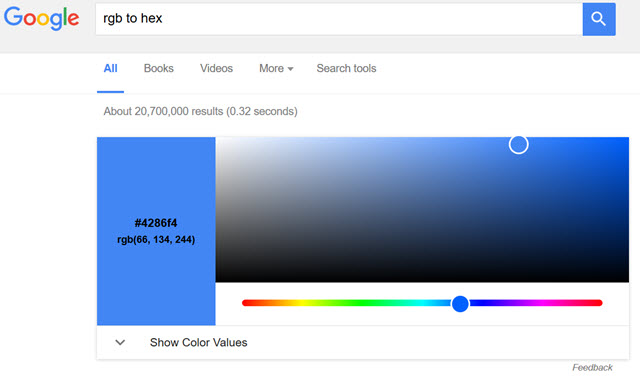Shared posts
تغییر کاربری اراضی | PDF مقاله سیاست کیفری ایران در قبال تغییر کاربری اراضی زراعی و باغها
سالن عقد و تولد پریا قم
سالن عقد و ازدواج فلوریا قم
سالن عقد و دفتر ازدواج کلبه قم
سالن عقد کویین لانژ غرب تهران
سالن آرایش و عروس مینل تهران
Disappearing Clicks
When Compete.com launched with credits-based pricing well over a decade ago I felt like a kid in a candy store using their competitive research tool. Recently Compete.com announced they were shutting down, but many of the link analysis & competitive research tools which leverage scraping have also started licensing clickstream data from sources like Clickstre.am & JumpShot.
These sorts of features add a lot of value to traditional keyword tools, as they can highlight the CTR on ads vs organic results & show if people click on anything after they search for a particular term.
When I read Ahref's recent blog post about integrating clickstream data I got that same kid in a candy store feeling I got when I first used Compete. Some highlights...
- their keyword database contains over 3 billion keywords
- they offer localized search volumes
- searches with clicks vs searches without clicks
- clicks per search
- repeat searches metric
- organic vs ad clicks
As an example of how the searches with clicks feature is helpful, consider Google's recently announced RGB conversion feature
In that image you can see how the feature displaces the result set.
What's cool about the Ahrefs feature is you can also see what sort of impact that feature has on click volumes.
After 1 month, 20% of the searches for [RGB to HEX] no longer had any clicks to an external website.
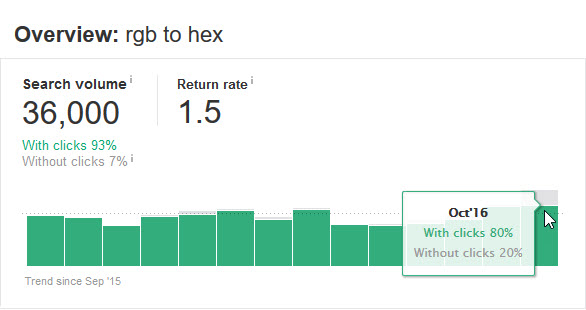
On the second month it looks like the "no click" rate was closer to 7%, so perhaps some of the initial additional search volume was driven by people searching for the related keywords after blogs covered the new feature.
But the nice thing about the feature is you can see how the click rate changes over time as the feature evolves.
In some areas like weather Google ends up dominating most the user behavior with their in-SERP feature.
About half of all weather keyword searches do not click on any listings. And then of those which do click, about 20% of people click on an ad.

That means the potential organic click volume for that keyword is only about 40% of the initial search volume estimates.
Search results keep getting more interactive features & some of them appear to be click black holes. Literally...
You guys, I've discovered a SERP black hole! I'm on #200 suggested PAA for this SERP?! Has anyone else seen an infinite PAA SERP before? pic.twitter.com/YgZDVWdWJ9— Britney Muller (@BritneyMuller) November 23, 2016
Here is a new item comparison feature table.
Has anyone ever seen this giant 'vs' featured snippet before? @STATrob @glenngabe @jenstar pic.twitter.com/qaKToKm5C4— Jesse Semchuck (@jessesem) November 22, 2016
As more of the value chain appears in the search results, more of the value chain which formerly appeared on websites disappears. This is true from a wide range of aspects including ad sales, content hosting, ad blocking & brand value.
General Ad Sales
No click into the publisher's site means no ad revenue for the publisher. Voice search will only accelerate the declines seen from mobile, which shifted user attention away from large screens with many listings to smaller screens with fewer listings & a far higher ad ratio in the search results.
Facebook Instant Articles & Google AMP
Google has already pushed hard to make hotel searches a pay-to-play vertical & yet some publishers are adopting AMP formatting in that vertical. Google is also forcing AMP down publisher's throats in other verticals like recipes.
@rustybrick New? pic.twitter.com/91TzKfS7tn— Jon Hogg (@ItsHogg) November 24, 2016
If central ad networks host your content then they get better user data for your content than you do as a publisher.
User Tracking, in Aggregate
Increased user tracking depresses premium ad sales & moves value from niche players to broad networks "Whether it’s a third party like Facebook or Google tracking across the web or an ISP leveraging its distribution arm, this is outside of consumer expectations. Importantly to the digital media industry, it also devalues the context and relationship of consumer trust which drives the businesses of premium publishers."
Ad Blocking
Some large sites like Google or Facebook either pay ad blockers or technically work around them within their apps. By funding ad blockers exempting the search result page from having their ads blocked, Google is ultimately defunding competing ad networks.
Brand Value
As search results get noisier & more ad heavy, Google is trying to coerce brands into re-buying their pre-existing brand equity. These efforts are effective, as on some branded & navigational searches over half the click volume goes to the ads. Here are a few examples from Ahrefs. The orange bar shows what percent of the SERP clicks are on ads.
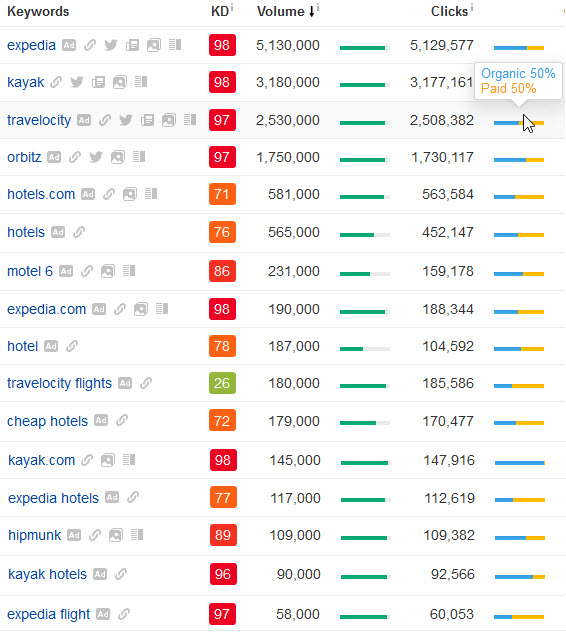
And the above doesn't even account for...
- Google Maps being an ad-heavy search engine.
- the Google Trips app which prevent searches from happening on Google.
- The mid-tail of travel search on mobile where Google does away with the concept of organic search results.
- Direct booking features complementing traditional AdWords ads & hotel price ads.
- Google buying ITA Software to dominate flight search. Notice the most popular term is Google's branded term & for the generic term [flights] 72% of people don't click on any external site while 37% of the remaining 28% of searches click on an AdWords ad.
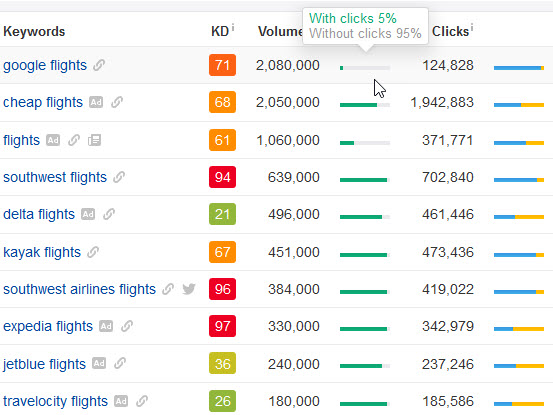
And almost everyone else in that industry is stuck licensing flight data from Google, as they own ITA Software.
So Google is eating the generic terms, the brand terms, and the search query pool more broadly.
There's a reason Google's online travel business is over twice the size of anyone else & has their biggest advertisers seeking more sustainable & more legitimate alternatives.
The biggest travel players are accustomed to Google’s moves and trying their best to adjust and work around them. Missing from this story is the fact that Google’s latest moves are making it nearly impossible for all but the smallest number of consumer travel startups to succeed. — Dennis Schaal
And some of the aggressive stuff carries over into other lines of business outside of travel. Google is also testing large image extensions on AdWords ads on cell phones that don't leave room for even a second AdWords listing on the screen. When one invests in brand they have to start thinking about how much they are willing to pay Google as an ongoing tithing for their success. Look at the following ads where a competitor bidding on a competing brand drives the brand owner's official site below the fold.

Google is willing to make their results worse (to the point they would consider something that looked like their search result page as an ad-heavy doorway redirect page of spam if hosted by anyone other than themselves) in order to monetize navigational searches.
What's more, you can't just opt out & ignore. When brands make agreements to not cross-bid Google has the FTC sue them.
On some high end fashion brands Google lists shopping ads which lead to third party sellers who sell used goods. Quite often counterfeits will also be in the mix. When the counterfeits are destroyed in the first wash, it is the brand owner who was took to the cleaners.
But there's a solution to that... they can pay Google ever-increasing protection.
@seobook sadly true. I work in the luxury fashion and CTR<15% for nav queries especially w/ sales, forced to buy own brand kw @andrealpar— Giuseppe Pastore (@Zen2Seo) November 26, 2016
DMOZ Shut Down
Last August I wrote a blog post about how attention merchants were sucking the value out of online publishing. In it I noted how the Yahoo! Directory disappeared & how even DMOZ saw a sharp drop in traffic & rankings over the past few years.

The concept of a neutral web is dead. In its place is agenda-driven media.
- Politically charged misinformed snippets.
- Ads cloaked as content.
- Public relations propaganda.
- Mostly correct (but politically insensitive) articles being "fact checked" where a minor detail is disputed to label the entire piece as not credible.
As the tech oligarchs broadly defund publishing, the publishers still need to eat. Aggregate information quality declines to make the numbers work. Companies which see their ad revenues slide 20%, 30% or 40% year after year can't justify maintaining the labor-intensive yet unmonetized side projects.
There is Wikipedia, but it is not without bias & beyond the value expressed in the hidden bias most of the remaining value from it flows on through to the attention merchant / audience aggregation / content scraper platforms.
Last month DMOZ announced they were closing on March 14th without much fanfare. And on March 17th the directory went offline.
A number of people have pushed to preserve & archive the DMOZ data. Some existing DMOZ editors are planning on launching a new directory under a different name but as of the 17th DMOZ editors put up a copy at dmoztools.net. Jim Boykin scraped DMOZ & uploaded a copy here. A couple other versions of DMOZ have been published at OpenDirectoryProject.org & Freemoz.org.
DMOZ was not without criticism or controversy,
Although site policies suggest that an individual site should be submitted to only one category, as of October 2007, Topix.com, a news aggregation site operated by DMOZ founder Rich Skrenta, has more than 17,000 listings.
Early in the history of DMOZ, its staff gave representatives of selected companies, such as Rolling Stone or CNN, editing access in order to list individual pages from their websites. Links to individual CNN articles were added until 2004, but were entirely removed from the directory in January 2008 due to the content being outdated and not considered worth the effort to maintain.
but by-and-large it added value to the structure of the web.
As search has advanced (algorithmic evolution, economic power, influence over publishers, enhanced bundling of distribution & user tracking) general web directories haven't been able to keep pace. Ultimately the web is a web of links & pages rather than a web of sites. Many great sites span multiple categories. Every large quality site has some misinformation on it. Every well-known interactive site has some great user contributions & user generated spam on it. Search engines have better signals about what pages are important & which pages have maintained importance over time. As search engines have improved link filtering algorithms & better incorporated user tracking in rankings, broad-based manual web directories had no chance.
The web of pages vs web of sites concept can be easily observed in how some of the early successful content platforms have broken down their broad-based content portals into a variety of niche sites.
When links were (roughly) all that mattered, leveraging a website's link authority meant it was far more profitable for a large entity to keep publishing more content on the one main site. That is how eHow became the core of a multi-billion Dollar company.
Demand Media showed other publishers the way. And if the other existing sites were to stay competitive, they also had to water down content quality to make the numbers back out. The problem with this was the glut of content was lower ad rates. And the decline in ad rates was coupled with a shift away from a links-only view of search relevancy to a model based on weighting link profiles against user engagement metrics.
Websites with lots of links, lots of thin content & terrible engagement metrics were hit.
Kristen Moore, vp of marketing for Demand Media, explained what drove the most egregious aspects of eHow's editorial strategy: “There’s some not very bright people out there.”
eHow improved their site design, drastically reduced their ad density, removed millions of articles from their site, and waited. However nothing they did on that domain name was ever going to work. They dug too deep of a hole selling the growth story to pump a multi-billion Dollar valuation. And they generated so much animosity from journalists who felt overwork & underpaid that even when they did rank journalists would typically prefer to link to anything but them.

The flip side of that story is the newspaper chains, which rushed to partner with Demand Media to build eHow-inspired sections on their sites.
- traveltips.usatoday.com
- homeguides.sfgate.com
- smallbusiness.chron.com
- the Arizona Republic
- Even the bastion of left-wing thinking Salon couldn't ignore the easy money opportunity.
Brands which enjoy the Google brand subsidy are also quite hip to work with Demand Media, which breathes new life into once retired content: "Sometimes Demand will even dust off old content that’s been published but is no longer live and repurpose it for a brand."
As Facebook & Google grew more dominant in the online ad ecosystem they aggressively moved to suck in publisher content & shift advertiser spend onto their core properties. The rise of time spent on social sites only made it harder for websites to be sought out destination. Google also effectively cut off direct distribution by consolidating & de-monetizing the RSS reader space then shutting down a project they easily could have left run.
As the web got more competitive, bloggers & niche publications which were deeply specialized were able to steal marketshare in key verticals by leveraging a differentiated editorial opinion.
Even if they couldn't necessarily afford to build strong brands via advertising, they were worthy of a follow on some social media channels & perhaps an email subscription. And the best niche editorial remains worthy of a direct visit:
Everything about Techmeme and its lingering success seems to defy the contemporary wisdom of building a popular website. It publishes zero original reporting and is not a social network. It doesn’t have a mobile app or a newsletter or even much of a social presence beyond its Twitter account, which posts dry commodity news with zero flair for clickability.
As a work around to the Panda hits, sites like eHow are now becoming collections of niche-focused sites (Cuteness.com, Techwalla.com, Sapling.com, Leaf.tv, etc will join Livestrong.com & eHow.com). It appears to be working so far...
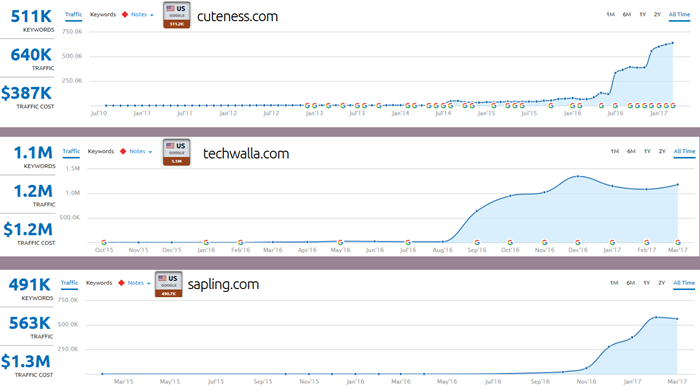
...but they may only be 1 Panda update away from finding out the new model isn't sustainable either.
About.com has done the same thing (TheSpruce.com, Verywell.com, Lifewire.com, TheBalance.com). Hundreds of millions of Dollars are riding on the hope that as the algorithms keep getting more granular they won't discover moving the content to niche brands wasn't enough.
As content moves around search engines with billions of Dollars in revenue can recalibrate rankings for each page & adjust rankings based on user experience. Did an influential "how to" guide become irrelevant after a software or hardware update? If so, they can see it didn't solve the user's problem and rank a more recent document which reflects the current software or hardware. Is a problem easy to solve with a short snippet of content? If so, that can get scraped into the search results.
Web directories which are built around sites rather than pages have no chance of competing against the billions of Dollars of monthly search ads & the full cycle user tracking search companies like Google & Bing can do with their integrated search engines, ad networks, web browsers & operating systems.
Arguably in most cases the idea of neutral-based publishing no longer works on the modern web. The shill gets exclusive stories. The political polemic gets automatic retweets from those who identify. The content which lacks agenda probably lacks the economics to pay for ads & buy distribution unless people can tell the creator loves what they do so much it influences them enough to repeatedly visit & perhaps pay for access.
Rank Checker Update
Recently rank checker started hanging on some search queries & the button on the SEO Toolbar which launched rank checker stopped working. Both of these issues should now be fixed if you update your Firefox extensions.
If ever the toolbar button doesn't work one can enable the Menu bar in Firefox, then go under the tools menu to the rank checker section to open it.
Years ago we created a new logo for rank checker which we finally got around to changing it today. :)
rhubarb upside-down spice cake

Chicken Florentine Pesto Pasta

Dear chicken Florentine. I like you. I like your spinach and your cream sauce.
But honestly? I don’t love you. You’re missing a little pizzaz.
So, I would like to introduce you to my friend pesto pasta.
You kinda need that punch from the pesto’s garlic, basil, and Parmesan.
Now we have the makings of love. Go forth and multiply.
Continue reading "Chicken Florentine Pesto Pasta" »
Would You Live in a Time Capsule Home?


Homeowners dedicated to keeping the design trends of the past alive have taken their love of all things vintage to an entirely different level. Remaining stuck in the past has never been in style, but the increasing number of buyers interested in living in a time capsule home suggests that a change is on the horizon.
Get Mom (Or Yourself) A New Fitbit For $20-$50 Off

If you’ve had your eyes on a Fitbit (may we recommend the new Alta HR?), or wanted to get one for Mom this month, the entire lineup is on sale right now on Amazon, with discounts ranging from $20 to $50.
One of the Best Annotation Tools for iPhone Just Got Some Great New Features

iPhone: Annotable is one of the best image annotation tools around, especially after Evernote abandoned Skitch a couple of years ago. Now, it’s been updated with a slew of new features, making it much more versatile.





